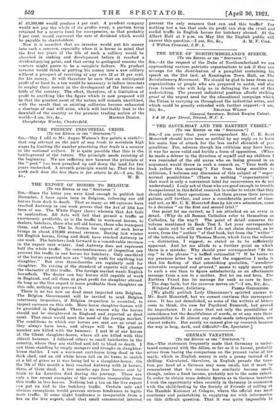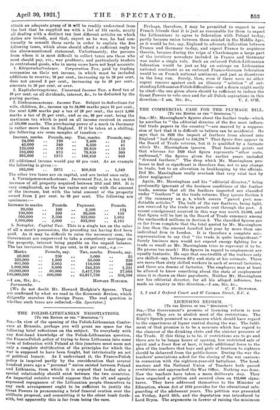GERMAN TAXATION.
[To THE EDITOR Or r= "SPECTATOR."] Sns,—The statement frequently made that Germany is under- taxed compared with the Allies, so far as it is honest, probably arises from basing the comparison on the present value of the mark, which in English money is only a penny instead of a shilling. Calculated, therefore, in English pounds the taxa- tion per head of a German may seem small, but it must be remembered that his income has similarly become small, though, unless a fixed income, probably not to the same extent. In order to obtain some definite figures as to German taxation I took the opportunity when recently in Germany in connexion with the child-feeding by the Society of Friends of calling at the Handels Kammer at Cologne, where the official was most courteous and painstaking in supplying me with information on this difficult question. That it was quite impossible to
obtain an adequate grasp of it will be readily understood from the fact that he supplied me with a list of 114 cards, nearly all dealing with a distinct tax (not different articles on which duties are levied), and that, expert as he was, he had con- tinually to consult these cards in order to explain the five following taxes, which alone should afford a sufficient reply to the above-mentioned statement. Unfortunately, the persons from whom it is most difficult to collect taxes are those who most should pay, viz., war profiteers, and particularly traders in contraband goods, who in many cases have not kept accounts.
1. .KOrperschaftssteuer. Corporation Tax, paid by trading companies on their net income, in. which must be included additions to reserve; 10 per cent., increasing up to 30 per cent, does not exceed 3 per cent., increasing up to 20 per cent., amounts to 20 per cent, or over.
2. Kapitalertragsteuer. Unearned Income Tax, a fixed tax of 10 per cent. on all dividends, interest, &c., to be deducted by the paying parties.
3. Einkommensteuer. Income Tax. Subject to deductions for wife, children, &c., income up to 24,000 marks pays 10 per cent., the next 6,000 marks pay a tax of 20 per cent., the next 5,000 marks a tax of 25 per cent., and so on, 60 per cent. being the maximum tax which is paid on all income received in excess of 395,000 marks. The purchasing power of a mark in Germany is rather more than in England. If it be taken at a shilling, the following are some samples of taxation:- Income, marks. Pounds, say. Tax, marks. Pounds, say.
24,000 .. 120 .. 2,400 .. 12 45,000 .. 240 .. 8,350 .. 41 125,000 .. 570 .. 39,850 .. 119 195,000 .. 975 .. 79,850 .. 399 395,000 .. 1975 .. 189,850 .. 949 All additional income would pay 60 per cent. As an example the following is given 595,000 .. 2975 .. 309,850 .. 1,549 The other two taxes are on capital, and are levied once only.
4. Vermiigenszuwachssteuer. Increment Tax, is a tax on the increase of all property acquired between 1913 and 1919. It is very complicated, as the tax varies not only with the amount of the increase, but with the total amount of the property owned from per cent. to 98 per cent. The following are specimens:- Increase in marks. Pounds. Payment.. Pounds.
20,000 .. 100 .. 2,500 .. 12f 100,000 .. 500 .. 30,000 .. 150 500,000 .. 2,500 .. 333,000 .. 1,665 1,000,000 .. 5,000 .. 833,000 .. 4,165 5. Notopfer. Capital Tax. This is a single tax on the value of all a man's possessions, the preceding tax having first been paid. As it may be difficult to raise the necessary sum, the Governnient are empowered to take a compulsory mortgage on the property, interest being payable on the unpaid balance. The tax increases from 10 per cent. to 64 per cent., e.g.:- Marks. Pounds, say.
Tax, marks. Pounds, say.
50,000 250 • • 5,000 .. 25 320,000 1,600 • • 50,000 .. 250 601,000 3,005 • • 116,000 .. 580 1,000,000 5,000
244,250 .. 1,221 10,000,000 50,000
5,417,750 .. 27,088 100,000,000 500,000 • • 63,917,750 .. 319,588 HOWARD HODGKIN. --I am, Sir, &c., Farncombe.
[We do not doubt Mr. Howard Hodgkin's figures. They are confirmed by what we read in the Economic Review, which diligently searches the foreign Press. The real question is whether such taxes are collected.-ED. Spectator.]



































 Previous page
Previous page